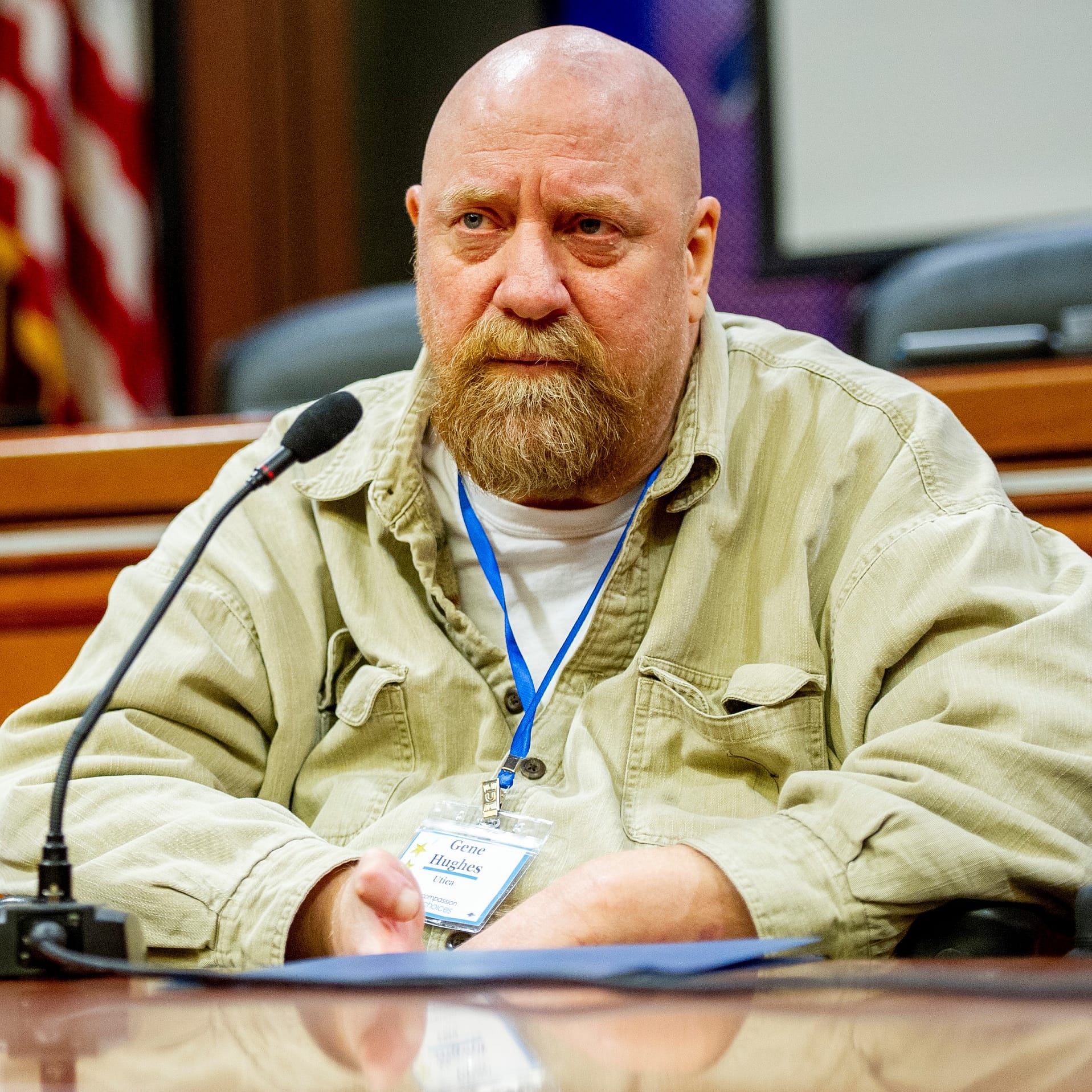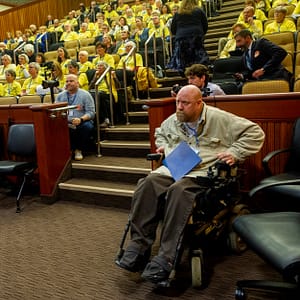
Gene Hughes was a passionate advocate for end-of-life options. A Utica resident, Gene used a wheelchair for more than three decades following a car accident. He passed away peacefully on Tuesday, September 7, 2021.
The following are Gene’s words, shared as part of Compassion & Choices’ 60 Reasons To Support New York’s Medical Aid in Dying Act campaign. Gene shared his story with lawmakers on January 20, 2021, 230 days before his death. In those 230 days, lawmakers could have acted to give Gene the end-of-life option he advocated for. How many people suffering until their final breath will it take before New York lawmakers pass the Medical Aid in Dying Act?
November 2018 was a milestone for me. It marked 35 years I’ve spent in a wheelchair after an automobile accident.
Believe it or not, being in the chair hasn’t been the worst thing. Dealing with things that come with it are the hardest: the pressure sores, the health issues, the reliance on others and the attitudes of many.
I’ve had a job that I love for more than 24 years. I’ve had mentors that have pushed and challenged me. The one area I’ve learned of and embraced is the notion that there is something called the “independent living philosophy.” Since the 1960s, people with disabilities have been fighting for control over our lives. Fighting to be able to make decisions that affect our lives.
The one thing I’ve tried to maintain in my life is independence. Independent living means something different to everyone, especially to someone with a disability. The independent living philosophy emphasizes consumer control over our lives, and people with disabilities are the best experts on our own needs. Independent living means that we demand the same choices and control in our everyday lives that our non-disabled brothers and sisters, neighbors and friends take for granted. We want to grow up with our families, go to the neighborhood school, use the same bus as our neighbors.

Gene Hughes at Compassion & Choices’ 2019 New York Spring Lobby Day.
The passage of the Americans with Disabilities Act (ADA) only strengthens the resolve of people with disabilities. The ADA allows the disability community the opportunity to live as equals to anyone. Self-determination and autonomy underlie the ADA; they are the rights people living with disabilities have sought our entire lives.
Disability organizations have been fighting for years for these rights. They have stood strong in the face of adversity, putting their health and safety on the line so the human and civil rights of people with disabilities are protected.
Yet, some of these same organizations are opposed to the Medical Aid in Dying Act. In my opinion, this is the height of hypocrisy.
They claim that what they erroneously refer to as “assisted suicide” legislation reinforces the idea that people with disabilities are burdensome and our lives are not worth living.
They claim that the disability community strongly opposes the belief that requiring the assistance of another individual for activities of daily living, such as dressing, bathing and toileting is undignified or a legitimate reason to legalize medical aid in dying.
Loss of dignity is not the same as disability, and only the person making the decision can determine the degree of dignity involved and how it impacts a decision to hasten death.
To advocate and strive for equality only gets cheapened by the claim that we are now vulnerable, or our lives are somehow now diminished, because of a law.
Allowing people with disabilities to make this decision at the end of life would empower us and legitimize our autonomy. We want control in life and we want control at the end of life.
This is not a disability issue! A disability or chronic condition alone is clearly not a terminal illness and therefore does not qualify under this legislation.
Medical aid in dying is only an option for terminally ill adults who are mentally capable of making healthcare decisions, have a prognosis of six months or less and can self ingest medication.
My life’s value cannot be diminished by medical aid in dying. To the contrary, my life would be empowered by passage of the Medical Aid in Dying Act. It would give me the autonomy I’ve worked so hard to maintain since my very first day in a wheelchair.
Mail contributions directly to:
Compassion & Choices Gift Processing Center
PO Box 485
Etna, NH 03750
Compassion & Choices is a 501 C3 organization. Federal tax number: 84-1328829